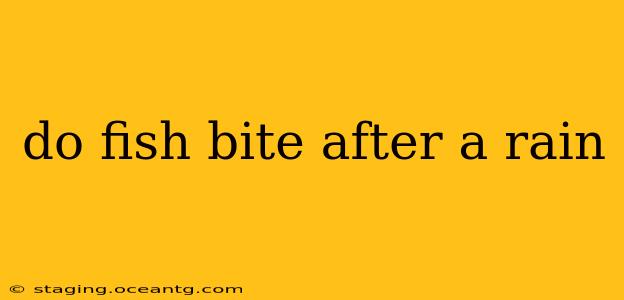The question of whether fish bite after a rain is a classic among anglers, sparking countless debates around campfires and online forums. The simple answer? It depends. While rain can negatively impact fishing in some situations, it often creates conditions that significantly improve the bite for certain species. Let's delve into the factors influencing fish behavior after a rainfall.
What Happens to the Water After a Rainstorm?
Several changes occur in the water after a rain event, directly influencing fish activity and feeding patterns:
-
Increased Water Levels: Rainfall elevates water levels in rivers, streams, and lakes. This can push fish into new feeding areas, making them more accessible to anglers. The added water often carries nutrients and oxygen, further stimulating the aquatic ecosystem.
-
Turbidity and Visibility: Depending on the intensity and duration of the rain, water clarity can decrease significantly. Muddy water reduces visibility, making fish less cautious and more likely to strike at lures or bait. This is particularly beneficial for anglers using techniques that rely on less precise targeting.
-
Oxygen Levels: Heavy rains can sometimes lead to a temporary decrease in dissolved oxygen, especially in slow-moving or shallow waters. However, in most cases, the rain replenishes oxygen levels, stimulating fish activity.
-
Water Temperature: Rainfall can slightly lower water temperature, impacting the metabolism and activity levels of certain fish species. Cooler water can make some species more sluggish, while others thrive in slightly cooler conditions.
-
Nutrient Runoff: Rain washes nutrients from the land into the water, enriching the aquatic environment. This increased nutrient load stimulates the growth of plankton and insects, the primary food source for many fish.
Do Fish Bite After a Rain: Species-Specific Considerations
The impact of rain on fishing success varies drastically depending on the fish species:
-
Bass: Largemouth and smallmouth bass often become more active after a rain shower, particularly in murky water. The reduced visibility allows them to ambush prey more effectively.
-
Trout: Trout, generally preferring clearer water, can be less active immediately after a heavy rain. However, once the water clears slightly, they often feed aggressively on the insects washed into the stream.
-
Catfish: Catfish are often less affected by changes in water clarity and tend to remain active after rain. The increased water flow and nutrient runoff often enhance their feeding opportunities.
-
Panfish: Similar to bass, panfish often benefit from the increased insect activity and reduced visibility following a rainfall.
How Long Does it Take for Fish to Start Biting Again After Rain?
The time it takes for fish to resume their feeding patterns depends on several factors, including the intensity and duration of the rain, the size and type of water body, and the specific fish species. Generally, fish will start feeding again once the water settles and clarity improves slightly. This can range from a few hours to a few days.
What Types of Bait Work Best After a Rainstorm?
Following a rain event, anglers should consider adjusting their bait selection based on water conditions and fish behavior:
-
Cloudy Water: Use larger, more visible lures or bait, such as spinnerbaits, crankbaits, or larger live bait. Strong scents can also be beneficial in murky water.
-
Clear Water: Stick to smaller, more subtle lures and bait that mimic natural food sources.
What are the Best Fishing Spots After Rain?
Areas with increased runoff or where insects and small fish are concentrated are usually excellent spots to target after a rain event. Look for areas near inlets, river mouths, or areas with overhanging vegetation where insects accumulate.
In conclusion, the question of whether fish bite after a rain isn't a simple yes or no. It's a complex interplay of factors, and understanding these factors can significantly improve your post-rainstorm fishing success. Remember to adapt your techniques and bait choices based on the specific conditions you encounter. The reward for patience and adaptation is often a fantastic fishing experience.
